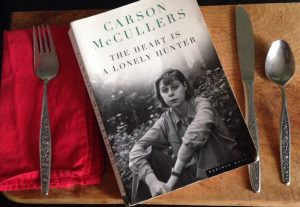~by Sherrie Flick
This is the first installment of Eat Drink Book. Each month I’ll explore food and drink in literature. This month it’s Carson McCullers’ The Heart is a Lonely Hunter. Written in 1940 when McCullers was just 23 years old this novel follows a host of townspeople and their interconnected, isolated, lonely lives. Obsessed with the dark corners of society, the slightly and overtly freakish people who inhabit the world with their fetishes and haunting thoughts, McCullers depicts people who lurk in shadows, wander into all-night restaurants like The New York Cafe.
McCullers uses food in The Heart … to help establish character, class, and setting. Singer, the character to which the other characters are drawn, the outsider (he moved to the small town from Chicago), the Jew–always has a distinguished selection of food in his small apartment. Fresh oranges and candies and wine or whiskey or gin, which he keeps neatly tucked into a closet. He serves his visitors ceremoniously. “They sat at the table and drank hot coffee out of blue cups. The room was cool and the half-drawn shades softened the hard glare from the windows. Singer brought from his closet a tin box that contained a loaf of bread, some oranges, and cheese. He did not eat much, but sat leaning back in his chair with one hand in his pocket (55-56).” Singer is a deaf mute and his silence adds to the accumulating grace. When Singer travels to visit his Greek friend Spiros Antonapoulos he brings a brightly wrapped fruit basket, a box of walnut-sized just-ripe strawberries. When he checks into his hotel room, he orders room service, a decadent combination of “…broiled bluefish, hominy, French toast, and hot black coffee.” Continue reading
![[PANK]](https://pankmagazine.com/wp-content/themes/pank/assets/images/pank-logo-large.png)

